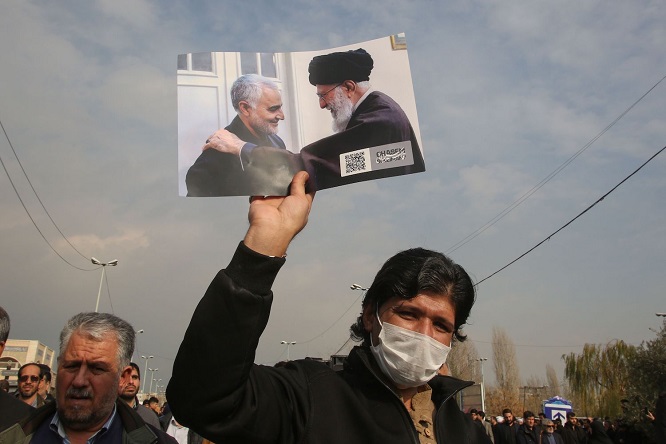Lacking coherent objectives and a strategy for achieving them, moves like the assassination of Qassem Suleimani are foreign policy as theater-and could leave the United States worse off.

By Stephen M. Walt
well, that didnít take long. 2020 is less than a week old, and U.S. President Donald Trump has managed to stumble into another pointless and dangerous crisis with Iran. It is the near-inevitable result of his myopic approach to the entire Middle East (and especially Iran) and another demonstration of Washingtonís inability to formulate a coherent and effective policy toward any important global issue.
When did this country get so bad at strategy?
In fairness, the problem predates Trump, although his own incompetence, impulsiveness, indifference to advice, and uncanny ability to pick third-rate advisors has made the problem worse. The end result may be more innocent lives lost-some of them American-and a further erosion in the United Statesí global position. And thatís assuming that Trumpís ordering of the killing of the Islamic Revolutionary Guard Corps commander Qassem Suleimani doesnít lead to all-out war.
With respect to Iran, the assassination is a strategic error entirely of Trumpís own making. Egged on by Saudi Arabia, Israel, hawkish institutes like the Foundation for Defense of Democracies, and some of his wealthy backers, the president abandoned the multilateral agreement that had successfully capped Iranís nuclear program and also created a diplomatic opening that a savvier administration could have used to address Iranís regional activities. He then began his campaign of so-called maximum pressure-a comprehensive program of economic warfare against Iran that sought to eliminate the countryís enrichment capacity, force Iran to change its foreign policy to suit the United States, and maybe topple the regime itself. Ordinary Iranians are suffering mightily as a result of U.S. sanctions, but the regime has neither caved to Trumpís demands nor collapsed. Instead, it has moved gradually to restart its nuclear program, cultivated closer ties with Russia and China, and retaliated against U.S. allies in the region. The logic of Tehranís response is straightforward and utterly predictable: If the United States wants to make life difficult for Iran, its leaders will demonstrate that they can make life difficult for the United States too. It wouldnít take more than a shred of strategic thinking to anticipate Iranís response and recognize that unilateral pressure was not going to work.
By eschewing diplomacy and relying solely on threats and coercion, Trump gave himself no choice but to back down or escalate once it became clear that maximum pressure had backfired. When an Iraqi militia with ties to Iran staged a rocket attack in early December 2019 that killed a U.S. contractor, Trump responded with airstrikes against the militia camps that killed some two dozen Iraqis. Pro-Iranian Iraqi demonstrators proceeded to besiege the U.S. Embassy in Baghdad, although with no loss of life. The demonstrators eventually dispersed, and the situation seemed to be deescalating. But then Trump approved the assassination of Suleimani, a very senior and highly respected Iranian official, in Baghdad early Friday morning.
To understand how this chain of events might look from Iranís perspective, consider how the United States might respond if a foreign adversary killed a member of the Joint Chiefs of Staff, the head of the CIA, or maybe even the vice president. Washington would not just shrug it off. To say this is not to defend Suleimani, who was by all accounts an ardent foe of the United States. It is rather to ask the proper strategic question: Did assassinating a prominent official of a foreign government advance the countryís national interest? Will this act make Americans safer and richer, or increase their influence around the world? The answer is: no and no.
For starters, Iran will almost inevitably respond, just as the United States would were the situation reversed. The regime will do so at a time and with means of its own choosing, and in ways designed to maximize the pain and political impact. Second, the assassination is going to inflame Iranian nationalism and strengthen hard-line forces in Iran, further reducing any possibility of regime change there. Third, killing Suleimani on Iraqi soil is a violation of Iraqi sovereignty that put its fragile government on even shakier ground, and it is worth noting that caretaker Prime Minister Adil Abdul-Mahdi has already condemned the U.S. action. Fourth, Trump has now given Iran even more incentive to acquire nuclear weapons, a step that would force Washington to go to all-out war or back down and accept an Iranian bomb. All this over a country that has serious disputes with some of the United Statesí regional partners but does not threaten the security or prosperity of the United States itself in any meaningful way.
And finally, thereís the precedent the United States is setting. As the political scientist Ward Thomas explained in a seminal article in 2000, there has long been a powerful international norm against assassinations by governments, largely because the leaders of powerful states understand that it is in their mutual self-interest not to try to kill each other. The taboo didnít completely eliminate the use of this tactic, of course, and Thomas argues that the norm has begun to break down in recent decades. But do we really want to live in a world where assassination is regarded as a perfectly normal way of doing business and becomes more and more commonplace? Surely hawkish American politicians who think killing Suleimani was acceptable donít really want to run the risk of ending up on somebody elseís target list. And to be sure, if Russian President Vladimir Putin ordered the killing of Ukrainian President Volodymyr Zelensky, or if North Korean leader Kim Jong Un decided to redouble his grandfatherís efforts to murder politicians in South Korea, it would be far harder for the United States to object.
Moreover, although taking out bad guys may appeal to a crude desire for vengeance, it rarely solves the underlying political problem. A lot of bad leaders have departed this mortal coil in recent decades, yet the political challenges they embodied continue to bedevil us. Al Qaedaís Osama bin Laden, Libyaís Muammar al-Qaddafi, North Koreaís Kim Jong Il, Iraqís Saddam Hussein, the Talibanís Mullah Mohammad Omar, the Islamic Stateís Abu Bakr al-Baghdadi, and many other U.S. foes are gone, but their deaths didnít magically solve the foreign-policy problems with which they were associated. Indeed, there is some evidence that "decapitation" (that is, killing top leaders) tends to empower extremists and incline them toward even greater violence.
In short, the Trump administrationís approach to Iran-including this most recent incident-appears devoid of strategic logic or purpose. Trump, Secretary of State Mike Pompeo, Secretary of Defense Mark Esper, and the rest of the administrationís foreign-policy team are like chess players who have failed to consider more than one move at a time and thus miss what should be an obvious fact of life in international politics: The other player gets to move their pieces too. Their denunciations, reinforcements, sanctions, and drone strikes are foreign policy as performance art, instead of the tough-minded and careful realpolitik that should inform a great nationís approach to the world.iran
Now for the really bad news: The lack of strategic thinking-formulating a clear objective and developing a coherent plan to achieve it that anticipates how others are likely to respond-isnít limited to the United Statesí dealings with Iran. And it goes well beyond the Trump administration, besides. Indeed, Iíd argue that the countryís ability to formulate clear and effective strategies has been steadily eroding for some time. In my next column, Iíll offer some additional illustrations of the problem and explain why genuine strategic thinking is now an endangered species in the Land of the Free.
LINK: https://www.ansarpress.com/english/13128
TAGS:






























 Violation of the sovereignty and rights of afghan citizens by America
Violation of the sovereignty and rights of afghan citizens by America




